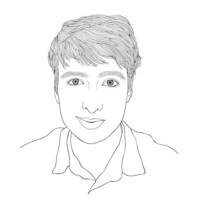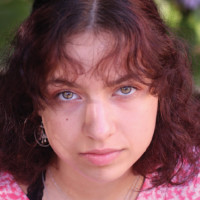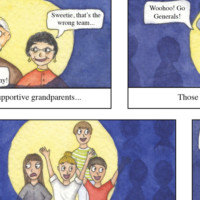
The tent on the edge of town is brown and gray now. They say it used to be red and blue — so inviting that it felt like home just looking at it — but hundreds of years have led to fading.
In a month I will turn eighteen, and I will have to go inside for the first time. But for now I am content with sitting on the other side of the field, closer to the city.
The wind is freezing, seeping underneath my jacket and causing the trees to sway. And yet, the tent stays completely still. It’s nerve-wracking and sends anger sizzling across my skin until my heavy coat begins to feel too warm. I grab a pinecone from the ground next to me and chuck it toward the tent.
It’s an unsatisfying throw, falling too far from the tent to calm me down.
“What if we didn’t do it? We just, left.”
I jump and whirl around. Rea stands by the tree behind me, hands in pockets, nervously digging in the dirt with the toe of her shoe. I don’t say anything back, but my anger has dissipated.
“Why do we always do what they tell us? Has anyone in this town ever had an original thought?” “Rea, shut up,” I mutter.
I don’t disagree with her. Our whole lives are handed to us on silver platters the second we enter adulthood, but we’re never provided with options. Hearing her question it out loud makes me nauseated.
“Honestly. Think about it. We could skip town. Take my dad’s car in the middle of the night and just leave. We wouldn’t ever have to step a foot in that tent.” Rea’s voice is a hushed, excited whisper, but I can’t help glancing around. We’re alone. I can’t decide if I’m grateful for that or not.
Slowly her words start to settle over me. There are benefits to the Experience. Less chaos. No life-changing decisions that lead to disaster. But there aren’t any decisions to be made at all, difficult or otherwise. We are completely stripped of our freedom to choose.
When I go home that night, it’s hours before I fall asleep.
* * *
“Our whole lives are handed to us on silver platters the second we enter adulthood, but we’re never provided with options.”
It’s the same field but different. Bigger. Rea and I are twelve.
“Bet I could beat you to the tent and back,” Rea says.
I roll my eyes and shove her, laughing. She’s laughing too. I love that laugh. So loud and honest, like she doesn’t care what you think. If she does, she doesn’t show it.
“Fine, if you’re so sure I’d win.” Her hands are on her hips when she says it, radiating defiance.
I glare at her, but that smile is so contagious. I am up and running hard.
The funny thing is, I am sure she’ll win. Rea’s faster, always has been. But I don’t mind losing, not really. Not when we collapse afterward, and I get to hear that laugh again.
When she stops, it’s sudden, so fast it’s like she hit a wall. I don’t notice in time and barrel into her. Lying on my back and gasping, I look up; I could swear Rea didn’t move a muscle.
I push myself up, wincing from the ache, and hobble forward until I’m standing by her side. We are closer to the tent than I have ever been. I could reach out and touch it if I wasn’t paralyzed with fear.
We stand there, my shoulders rising and falling with each gasp. Rea is completely still, quiet.
Then she lifts her hand and stretches her arm out. A finger traces a line on the tent that separates brown from gray. Down, down, and then still. There’s a strange hunger in her eyes. It makes her face look darker, angular.
“Rea what are you doing?” My voice sounds squeaky.
It takes a second for her to hear me. She blinks hard and frowns, her arm dropping back down to her side. The hunger is gone, replaced by something else.
“It’s not fair.” She’s so quiet that the wind almost whisks away her words.
“What?”
“I don’t wanna go in there.”
The image of her finger tracing the side of the tent flashes in my mind, warning. Something is wrong here. Very wrong. But I ignore it. I stare at Rea, mouth open.
“What? Why are you looking at me like that?” she asks.
“Rea, I’m the one who hit my head on the ground, not you. Why are you acting weird?”
“I’m not acting weird! I don’t wanna go in there. We always do what grown-ups say.”
“Yeah, because they’re grown-ups. They did the Experience thing. They know.”
“Know what? They don’t know anything. And it’s not fair because I wanna decide what I do, I don’t want whatever is in that tent to decide, it doesn’t know me. I know me. You know me. You’re the only other person in the world that knows me as well as I know me.”
We are quiet. She is breathing hard. I am still.
“We could run away,” she whispers. Or doesn’t. It might have been the wind.
We are quiet.
* * *
I am groggy and disoriented from old memories when her call wakes me up at 3 a.m. Lucky for Rea, I’ve always been a light sleeper, and I’m dressed and out the door in ten minutes.
“Hey,” I whisper as I lower myself over the outer gate and land next to her. I don’t have the heart to say “Happy Birthday.”
She nods at me in response but doesn’t say anything. I understand the silence, so I don’t push it. I cross my arms — protection, safety — and watch the white puffs of air escape from behind our lips.
We step quietly. The shuttle isn’t running this early but we wouldn’t take it even if it was. Instead we walk. We pass by Rea’s childhood house and she speeds up. There’s no way anyone in her family is up this early, but the nervousness is wafting off of her in thick clouds.
By the time we finally reach the field, Rea is trembling slightly and her breath is coming out shaky and short.
“Rea, stop. We’re here.”
We stand, still and staring at the tent. It seems to be glowing in the half-light, eerie and strange at four in the morning.
“You’ll wait for me?”
I look at her, her eyes glistening and wide with worry.
“Yeah, of course,” I mutter.
Suddenly she turns to me. Fear. “What if I just don’t do it, Ash? I don’t have to, right? We talked about it. Remember? I said it before. What if I don’t?”
Rushing words, fast and shaky. Begging for reassurance.
Her eyes are filled with shadow but there’s something deeper there that makes an ache blossom in my chest. Gently I pull her into a hug. I feel as scared as she looks. I want to run.
Instead I hold her while she stops shaking. But when she pulls away, the realization hits me square in the chest.
Your life changes when you go in that tent. For the rest of your life, everything is different. And despite what everyone says about the excitement of change, I don’t want to lose my best friend.
Rea pulls back and meets my eyes. Her eyebrows furrow slightly, seeing something in my face that I can’t hide from her.
We stand there, staring at each other. She’s waiting for me to say something. We could run away.
My mind feels both blank and chaotic, and when she squeezes my hand and pulls away, I still haven’t said anything. My throat closes up as I watch her walk toward the tent.
I can hear my blood pumping in my ears.
I’m counting her steps, waiting for her to turn around and run back to me. But she doesn’t.
Her hand pushes the tent flap open. “Wait- Rea!”
She doesn’t hear me. I begin to run to her, my heart beating in my throat. “Wait!” I yell this time, and though she’s already inside, I see her turn and we make eye contact between the open flaps. I catch her smile, sweet and familiar and relieved, before the tent closes.
I keep running, the corners of my mouth turned up in giddiness.
Seconds pass and she hasn’t come out. Too late.
An intense fear stops me abruptly, ties my feet to the ground. I do not want to go into that tent, not now.
Despair fills my lungs instead of air and suddenly I can’t breathe, can’t see. My lungs won’t expand or contract, yet I’m gasping.
Soon exhaustion takes over and I curl up on the ground, watching the grass that I can’t touch.
The sun rises and frost on the grass melts on my clothes. Rea’s family shows up eventually, worried at first but later humming with an electric excitement only they feel. My parents stop by to wrap a blanket around my shoulders and hand me a thermos of something steaming.
The cold winter sun moves across the sky and Rea finally comes out of the tent.
The glazed look, I expected. The blinking eyes in the too-bright sun and the “where am I” confusion.
But what I don’t expect is the smile. The contentedness, the “just right” Goldilocks optimism.
And that, more than all the rest of it, is what hurts the most.
“Your life changes when you go in that tent. For the rest of your life, everything is different.”
She sees her family first. Of course she does, they’re causing a ruckus, the younger ones jumping up and down and all of them cheering like crazy. They envelop her in hugs and I stop looking. Watching them feels intrusive. Instead I stare into my thermos.
I’m sitting alone underneath the tree we always sat by. Pretending that I don’t want her to notice me.
“You waited.”
I look up and she’s there, hands in pockets. She doesn’t look completely different, but I’m more focused on keeping my knuckles white around the thermos to stifle the trembling in my hands.
“Of course I waited.” My voice is quiet and meek and not mine.
She smiles but doesn’t say anything. I stop looking at her.
“I was wrong, Ash.”
By this point I can’t deny I saw it coming. But it doesn’t make it hurt any less. When she sits next to me I flinch involuntarily and shift away from her slightly.
“Ash, it’s different. Than I thought. It’s not … I was wrong.”
I bite the inside of my cheek, hard, eyes blinking much more than they should be.
“Ash, please-”
“How different, Rea? How is it different?” The words burst out before I can stop them.
Silence. I’m still not looking at her. Then- “You know I can’t tell you that.”
No “if I could I would,” no “meet me here later,” not even “better than we expected.”
Desperately I stare at her, searching for a sign that she’s still my same Rea. I’m searching for a label, something to describe the difference in her, but I can’t find one.
“I know,” I say, but it comes out as a weak whisper.
She smiles and seems satisfied. Then she leans over and gives me a hug, and when I hug her back there’s a flicker in my chest. Because that hug is still her.
When she pulls away, saying that she’ll see me later, there’s a rush of cold air and the flicker dies, leaving me feeling empty.
* * *
There is a frantic desperation pounding in my chest. I do not want to go to school today.
When I leave the Dorm, Rea looks up from her phone. She’s leaning against the fence and her face brightens when she sees me.
“Hey Ash!”
I nod at her in response. She pushes herself off of the wall and shoves her hands into her pockets sheepishly. “Walk to school with me?”
Even her voice is foreign. But I nod and say “sure” like nothing bothers me. Like nothing is different.
I go through the day on automatic. Our classmates congratulate Rea on her Experience, asking her questions about it that she answers with laughter and head-shaking. I pretend I don’t notice her trying to catch my eye. My other friends give me sympathetic looks, as if they know what’s going on. They don’t. They think I’m upset my Experience wasn’t first instead.
It only takes a matter of days for Rea to stop making an effort with me. Small smiles are exchanged in passing but I soon realize that I am not part of the future she was assigned.
I try to act like it doesn’t hurt how fast it ended.
For weeks I wander. I don’t go back to the field. I can’t. It hurts too much.
Instead, I walk through the city. I don’t pay attention to where I go. It is aimless, the wandering. I am on a train traveling through time toward my Experience and it will not stop for anything. I am simply existing.
For weeks I think only of one question. What will I do when my birthday comes and the tent sits waiting for me in the field? Stay or go. Follow through or run.
Rea chose the former. I can’t decide.
* * *
“How’re you feeling Ash?”
We’re sitting at the kitchen table after our last weekly family dinner, clutching cups of tea like they’re lifelines. My Experience is tomorrow.
“I’m good.”
“Are you sure?” My mom is looking at me strangely, like she’s expecting something else. “You don’t have to be.”
She says it so casually, all maternal and caring, that I almost don’t notice it: the hint of something else. Hope?
I look up, but she’s not making eye contact, suddenly fascinated by the honey melting off the spoon she’s stirring her tea with.
“What do you mean?” I ask hesitantly.
She still isn’t looking at me when she says, “Just that it’s okay if you’re nervous. I definitely was.”
I don’t say anything. If I do, she’ll stop talking.
We’re not allowed to discuss our Experiences with other people, ever. Especially not with our own children.
“The night before was so … Everything was going to be different. Change is terrifying because you feel like you’re not in control. That’s one of the things that the Experience takes care of.”
I swallow as she pauses to drink her tea. The air in the room has gotten thicker.
“My dad sat at our kitchen table with me, just like we are now. Gave me almost this same talk.
He was … I would have liked you to meet him.”
She sighs and trails off, thinking. She barely looks at me. I have stopped breathing. Talking about our pasts, the time before your Experience, is just as forbidden, if not more, as talking about the Experience itself.
For all I know, her dad is still alive. I will never know. I will never meet him.
I open my mouth, not sure of what I’ll say. I want to ask: what should I do? I am tired of my lonely indecision, desperate for someone else’s input.
But when she touches my hand and smiles at something over my shoulder, I glance back. My dad is standing in the doorway. The expression on his face is questioning, and I wonder how much he heard.
“I think it’s time we all headed to bed. Big day,” my mom mumbles, taking my empty tea cup from the table and heading into the kitchen.
I move to leave after her but my dad stops me with a gentle hand on my arm. “I want you to know that, no matter what happens tomorrow, we will always love you. We are so proud of how … strong-willed you have become.”
What happens tomorrow. I don’t ask what he means. He hugs me and leaves without a backward glance. Calm washes over me, yet I still feel like I’m drowning.
* * *
It’s early. When I open my eyes, the room is dark. Pushing, pressing darkness. Too early.
Then light, harsh but low from my desk. A quiet buzzing. I ignore it.
But the sound doesn’t stop, and it rushes like water over my head, into my ears until my skin begins to itch with the buzz.
When I drag myself across the room and squint against the bright screen, I see the messages. She’s outside. She wants to talk. It’s important. She wishes me a happy birthday. I don’t answer and instead turn the phone off. I slip back into bed and back into sleep.
Morning comes what feels like minutes later. Light through the curtained windows whispering prayers already in my head. You are not the decisions made for you. No matter what happens tomorrow. Strong-willed. We are so proud.
You are not the decisions made for you.
“Good morning honey. How’d you sleep?” My mom sounds rehearsed, handing me a cup of tea as I enter the kitchen.
“Good.”
There’s a second of hesitation, enough time for me to hold my breath and hope for a continuation of last night’s conversation, before she constructs a smile. “You ready?”
Am I ready? You are not the decisions made for you. I am not ready. I don’t know what I want. What I need.
I nod and smile back. She is proud. No matter what.
“Ready,” I say, unsure if she believes me.
My Farewell Breakfast is endless and lasts only seconds, simultaneously. I cannot decide.
We take the shuttle to the field. It is Saturday at noon and the shuttle is nearly empty. My few friends who haven’t had their Experience yet will meet us there. It’s a chance for them to say goodbye, to wish me well, to take selfish mental notes on how to act before their own Experience.
Rea will be there.
When we step off, she’s standing by the tree. I think I am going to be sick, until she sees me and smiles. I forget that we aren’t supposed to be friends anymore.
“Hey, you. Ready?”
I am not ready. Someone starts clapping. I glance at my parents. They are holding back tears, but I can’t tell whether the tears are joyful or fearful.
The tent looks innocent today. But I stare too long and suddenly the creases in the fabric look like faces, blank and staring. Its stillness makes me overwhelmingly dizzy.
Rea laces her fingers through mine and squeezes my hand until I look at her. There is something like fire in her eyes but I don’t know what it means. I am scared.
Then she nods slowly. That gaze like she knows exactly what I’m thinking. She probably does.
Squeezes my hand one more time.
I let go.




